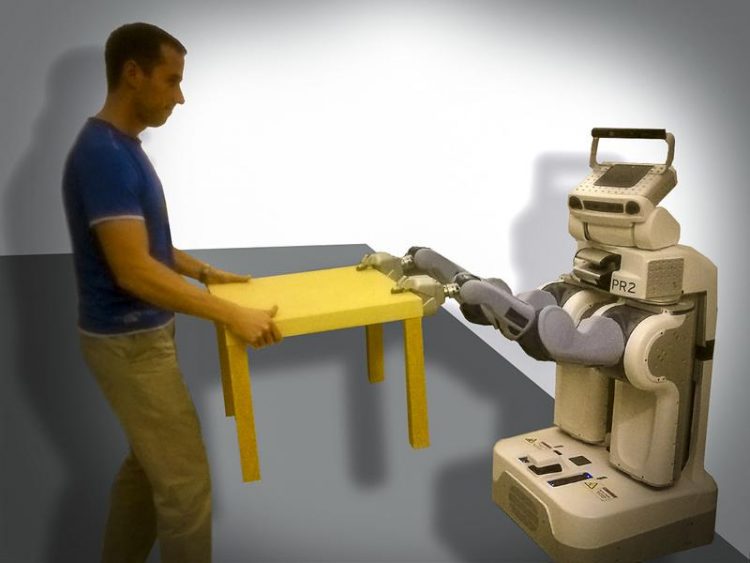Research on “socially competent” robots

Die Universität Osnabrück forscht im Rahmen eines internationalen Forschungskonsortiums am Roboter mit sozialer Kompetenz. Foto: School of Computer Science and Communication, KTH, Schweden
The groups of researchers from Barcelona, Berlin, Hamburg, Hannover, Hatfield (UK), Osnabrück and Stockholm are going to tread completely new paths.
“In contrast to the traditional approach of social interaction as a highly complex process of partners “reading each other’s thoughts”, in this project, social perception is to be considered as a function conveyed primarily by actions and their effects. To this end, human social understanding and behavior is to be explored and implemented in robots,” Osnabrück University’s cognitive scientist Professor Dr. Peter König explained.
Current research assumes that even highly complex social interactions are grounded in basic sensorimotor behavior patterns. These “socializing Sensori-Motor Contingencies” (socSMCs) are of vital significance for perceiving the world.
The key hypothesis of the new project implies that it is crucial to learn and master these contingencies between actions and effects in order to enable efficient social interaction. These mechanisms are to be investigated in further detail in interactions between people, people with autism and robots.
“The immediate objective of this project is to transfer the research results gained to information-theoretic and neurocomputational models, in order to train humanoid robots to socially interact with humans more efficiently, and also to gain a better understanding of how socSMCs work in the human brain, thus, for example, enabling people with autism to better integrate themselves in our society,” Professor König added.
The ambitious long term vision is to develop a new socially competent robot technology that is grounded in completely novel insights into what constitutes intact social behavior and what triggers associated functional disturbances.
Such new findings will pave the way for further theories and strategies to be tested in human-robot interaction and cooperation and to finally apply them for a multitude of assistant tasks by equipping control algorithms for robots with social competencies.
Project participants:
UKE UNIVERSITY MEDICAL CENTER HAMBURG-EPPENDORF, Department of Neurophysiology and Pathophysiology; Professor Dr. Andreas K. Engel – coordination
UNIVERSITAT POMPEU FABRA, Department of Information and Communication Technologies, Professor Dr. Paul F.M.J. Verschure
OSNABRÜCK UNIVERSITY, Neurobiopsychology, Professor Dr. Peter König
KUNGLIGA TEKNISKA HOEGSKOLAN, School of Computer Science and Communication, Professor Danica Kragic
GOTTFRIED WILHELM LEIBNIZ UNIVERSITÄT HANNOVER, Institute of Sports Science, Professor Dr. Alfred Effenberg
WHITE MATTER LABS GMBH, Fabian Stelzer
THE UNIVERSITY OF HERTFORDSHIRE HIGHER EDUCATION CORPORATION, School of Computer Science, Dr. Daniel Polani
PAL ROBOTICS SL, Francesco Ferro
Additional information for the media:
Professor Dr. Peter König, Osnabrück University,
Institute of Cognitive Science,
Albrechtstraße 28, 49076 Osnabrück,
Tel.: +49 541 969 2399, Fax: +49 541 969 2596,
E-mail: peter.koenig@uni-osnabrueck.de
Internet: http://cogsci.uni-osnabrueck.de/~NBP/
Media Contact
More Information:
http://www.uni-osnabrueck.deAll latest news from the category: Awards Funding
Newest articles

Innovative vortex beam technology
…unleashes ultra-secure, high-capacity data transmission. Scientists have developed a breakthrough optical technology that could dramatically enhance the capacity and security of data transmission (Fig. 1). By utilizing a new type…

Tiny dancers: Scientists synchronise bacterial motion
Researchers at TU Delft have discovered that E. coli bacteria can synchronise their movements, creating order in seemingly random biological systems. By trapping individual bacteria in micro-engineered circular cavities and…

Primary investigation on ram-rotor detonation engine
Detonation is a supersonic combustion wave, characterized by a shock wave driven by the energy release from closely coupled chemical reactions. It is a typical form of pressure gain combustion,…



